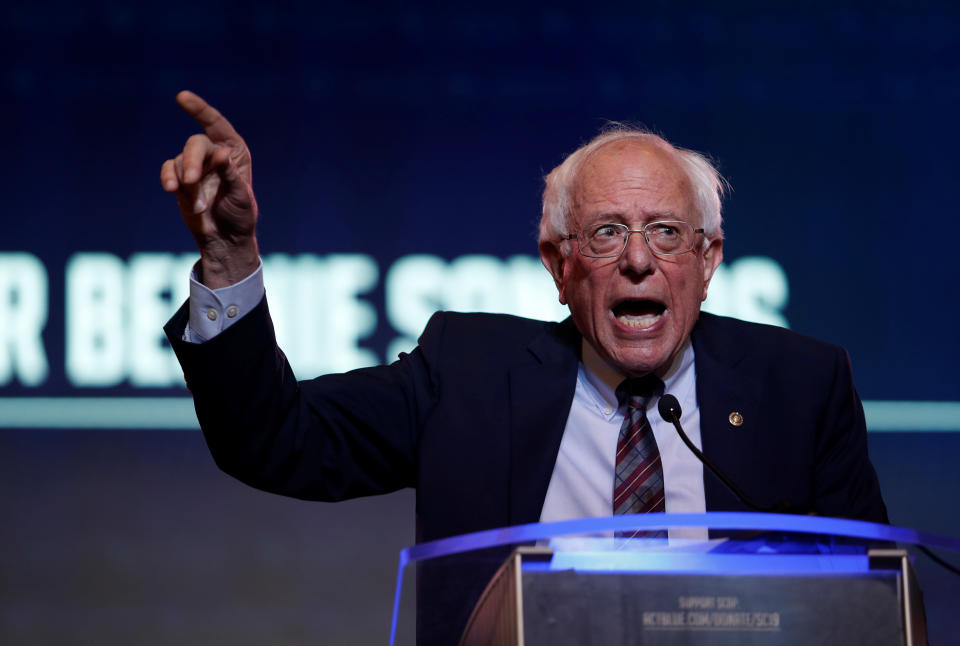Democratic debate showed most every 2020 candidate talks like Bernie Sanders on wealth inequality
Senator Bernie Sanders (I-VT) was not among the 10 Democratic presidential hopefuls who took the debate stage in Miami on Wednesday. But his brand of attack on the power of wealthy people and large corporations — made famous with an insurgent presidential campaign in 2016 — stood behind just about every podium.
Progressive Senator Elizabeth Warren (D-MA), a longtime ally of Sanders on the left, opened the night with a broadside against an economic system that unfairly favors the rich. Later, New York City Mayor Bill de Blasio echoed the sentiment: “This is supposed to be the party of working people.”
But even moderate candidates, like Senator Amy Klobuchar (D-MN) and Rep. Tim Ryan (D-OH), highlighted the economic injustice that divides haves from have nots. In all, eight of the 10 candidates voiced Sanders-style economic populism — though a sharp disagreement over “Medicare for All” showed divides in the substance behind their rhetoric.
From the outset of the debate, the rich came under fire.
“If billionaires can pay off their yachts, students should be able to pay off their student loans,” Klobuchar said. Former Texas Congressman Beto O’Rourke, who advocated for raising the corporate tax rate, said the economy “is rigged to corporations and to the very wealthiest” who “can pay for access and outcomes.”
Congresswoman Tulsi Gabbard (D-HI) added, “The American people deserve a president who will put your interests ahead of the rich and powerful.”
Even Senator Cory Booker (D-NJ), known for rhetoric that favors optimism over finger-pointing, said “dignity is being stripped from labor” by large companies. But he reserved his strongest criticism for the pharmaceutical and insurance industries, which he said “are profiteering off of the pain of people in America.”
Exceptions to the populist stance came from former United States Secretary of Housing and Urban Development Julian Castro and former Maryland congressman John Delaney, who described himself as “different than everyone else here on stage.”
“Prior to being in Congress, I was an entrepreneur. I started two businesses,” Delaney said, suggesting he considers issues from the perspective of both working people and the business owners who employ them.

‘How can you defend a system that’s not working?’
Early in the two-hour debate, a divide over “Medicare for All” revealed policy differences behind the room’s populist fervor. When MSNBC host Lester Holt asked the candidates to raise their hands if they supported getting rid of private health insurance in favor of a government-run plan, only two candidates complied: Warren and de Blasio.
Warren defended her position, describing the business model of insurance companies as an effort “to bring in as many dollars as they can in premiums and to pay out as few dollars as possible for your health care.”
Soon afterward, O’Rourke forwarded a healthcare policy proposal that calls for a mix of publicly provisioned Medicare and privately held insurance. “If you're a member of a union that negotiated for a health care plan that you like because it works for you and your family, you're able to keep it,” he said.
In one of the most contentious exchanges of the night, de Blasio then confronted O’Rourke: “Private insurance is not working for tens of millions of Americans,” de Blasio said. “When you talk about the co-pays, the deductibles, the premiums, the out-of-pocket expenses. It's not working. How can you defend a system that's not working?”
“For those for whom it's not working, they can choose Medicare,” O’Rourke responded.
While the Democratic field largely shares a goal of providing insurance for all Americans, the question of whether to do away with private insurers has been a sticking point for months. In January, Senator Kamala Harris (D-CA) said in a CNN town hall that she would eliminate private insurers, but backtracked a day later, when her campaign said she would be open to more moderate plans. The candidates differ over the cost and effectiveness of competing proposals.
But on Wednesday, a final attack from de Blasio on O’Rourke played into the tenor of the night, underscoring ideology rather than policy outcomes: “Why are you defending private insurance to begin with?” he asked.
Ten more Democratic presidential hopefuls are set to debate in Miami on Thursday night. It is yet to be seen whether the night’s candidates, among them South Bend Mayor Pete Buttigieg and Harris, will aim verbal pitchforks at the rich.
Viewers can count on Sanders-like rhetoric from at least one candidate: Sanders.
Max Zahn is a reporter for Yahoo Finance.
Read more:
How black women could give Kamala Harris a financial boost in 2020
Amazon's HQ2 was a showdown between a union city and a tech giant
How Donald Trump strengthened The New York Times and grew a Mexican billionaire's fortune
Follow Yahoo Finance on Twitter, Facebook, Instagram, Flipboard, SmartNews, LinkedIn,YouTube, and reddit.
